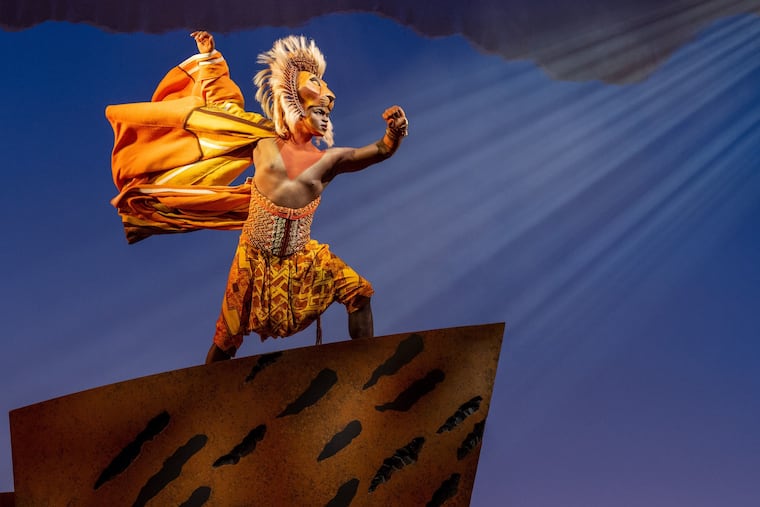‘The Lion King’ and its 110-plus custom puppets have landed in Philadelphia
For Michael Curry, co-creator of the musical’s masks and puppets, Zazu is the hardest puppet to operate. Catch the red-billed hornbill (and more) at the Kimmel Center.

Over the 26 years since The Lion King first premiered, anyone who’s seen the show would agree: The costumes are incredible. Elaborate puppets and masks meld actors with animals in a stunning display and include a four-person-operated elephant, gazelles, hyenas, giraffes, and its mane characters — the lions.
The musical, running at the Academy of Music from Aug. 16 to Sept. 10, celebrated its 10,000th performance on Broadway earlier this year (an achievement shared only with Chicago and Phantom of the Opera) and continues to play to sold-out audiences across the world. That fame wouldn’t have been possible without costume designer and director Julie Taymor — who won the 1998 Tony Award for costume design — and her puppet and mask co-designer, Michael Curry.
Curry and Taymor studied masks from Oceania at the Metropolitan Museum of Art and gained inspiration from other puppet arts, including Turkish and Northern European shadow puppetry, Japanese bunraku, and, of course, African mask-making. More than 110 custom puppets appear in the production.
The pair crafted the masks using carbon fiber (the lightweight material commonly used in airplanes), silicone rubber, and other materials depending on the character — Simba’s mane uses broom bristles, Scar’s mask uses turkey feathers.
“The real goal was to admit to ourselves that the actor was the most important part of the equation, not the animal,” said Curry. The masks sit primarily on top of the head, allowing actors to emote while still retaining that image of their character.
“The best example is Mufasa, where you want the strength of the sun, this sort of iconic circular image, and then his head is like the sunrise coming over the horizon. You can’t not look at it.”
Curry is based in Portland and runs his own design company. After Lion King, he went on to create dinosaurs and Transformers at Universal Studios, a flying dragon for Cirque du Soleil, and another notable lion: the massive gold feline that Katy Perry rode in the 2016 Super Bowl halftime show.
Still, The Lion King has remained one of Curry’s career highlights for its originality and staying power. Over the years, the masks and puppets have remained largely consistent. “The audience will never notice it, this is totally geek talk, but we’ve had to adjust color” because contemporary stages now use LED lights, which “produce a different effect on color, fabric, and makeup,” Curry explained.
The types of puppets vary. Curry’s favorite is the cheetah, which he described as “the ultimate union between animal form and human form.” The actor stands upright while the cheetah puppet extends from their hips; the actor and puppet heads are connected with thin strings, and the actor controls the cheetah using sticks attached to the paws.
While the large-scale puppets like the giraffes — played by stilt walkers — and the elephant are impressive, it’s Zazu, the comical African red-billed hornbill, who is arguably more difficult to perform.
“He’s the most complicated puppet in terms of pure prestidigitation,” said Curry. The actor “has five different levers that he’s pulling delicately with his gloved hands, while not trying to look like he’s operating it … it’s like a violin.” Oh, and he has to be funny, too.
The Lion King legacy really hit Curry last November, during the 25th anniversary performance, when dozens of former Simba and Nala actors, including original cast members, attended the show and sang together. For Curry, the musical still resonates because it’s timeless, and audiences love a royal family story.
“The Lion King,” Aug. 16-Sept. 10, Academy of Music, 240 S. Broad St., Phila. Tickets at https://www.kimmelculturalcampus.org/events-and-tickets/202223/broadway/the-lion-king/